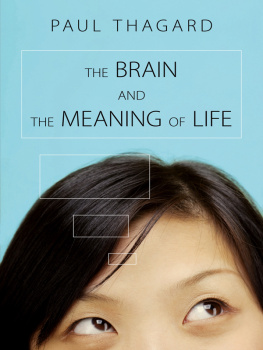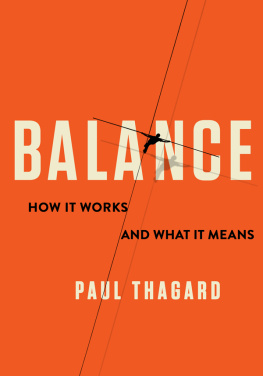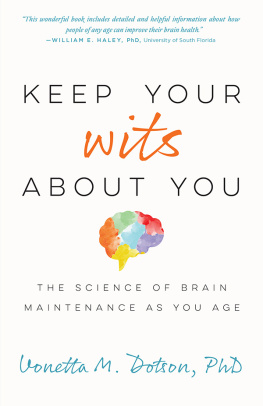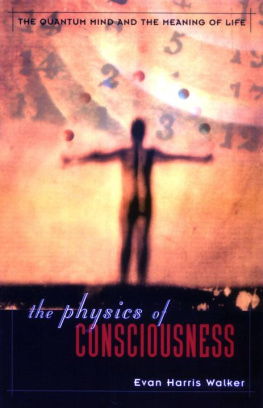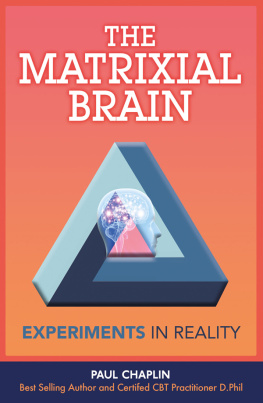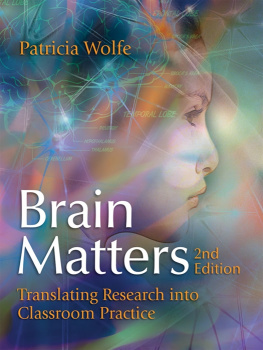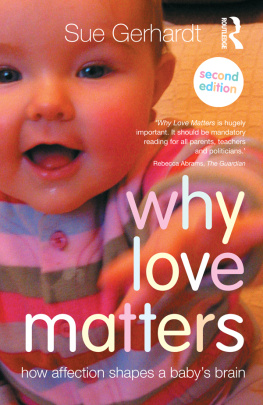Paul Thagard - The Brain and the Meaning of Life
Here you can read online Paul Thagard - The Brain and the Meaning of Life full text of the book (entire story) in english for free. Download pdf and epub, get meaning, cover and reviews about this ebook. year: 2010, publisher: Princeton University Press, genre: Religion. Description of the work, (preface) as well as reviews are available. Best literature library LitArk.com created for fans of good reading and offers a wide selection of genres:
Romance novel
Science fiction
Adventure
Detective
Science
History
Home and family
Prose
Art
Politics
Computer
Non-fiction
Religion
Business
Children
Humor
Choose a favorite category and find really read worthwhile books. Enjoy immersion in the world of imagination, feel the emotions of the characters or learn something new for yourself, make an fascinating discovery.
- Book:The Brain and the Meaning of Life
- Author:
- Publisher:Princeton University Press
- Genre:
- Year:2010
- Rating:3 / 5
- Favourites:Add to favourites
- Your mark:
- 60
- 1
- 2
- 3
- 4
- 5
The Brain and the Meaning of Life: summary, description and annotation
We offer to read an annotation, description, summary or preface (depends on what the author of the book "The Brain and the Meaning of Life" wrote himself). If you haven't found the necessary information about the book — write in the comments, we will try to find it.
The Brain and the Meaning of Life — read online for free the complete book (whole text) full work
Below is the text of the book, divided by pages. System saving the place of the last page read, allows you to conveniently read the book "The Brain and the Meaning of Life" online for free, without having to search again every time where you left off. Put a bookmark, and you can go to the page where you finished reading at any time.
Font size:
Interval:
Bookmark:
Acknowledgments
For comments on earlier drafts, I am grateful to Jonathan Aycan, William Bechtel, Chris Eliasmith, Lloyd Elliott, Scott Findlay, Carole Lee, Abninder Litt, Josef Nerb, Cameron Shelley, Peter Slezak, Terry Stewart, and Joanne Wood. Thanks to my editor, Eric Schwartz, for helpful suggestions and enthusiastic support, and to Lauren Lepow for skillful copyediting. Thanks to John Michela and Jennifer La Guardia for useful suggestions about goals and needs. Vicki Brett helped with the references. were produced by Peter Sylwester, adapted with permission from figures in Sylwester (2007). Thanks to Don Addis for the use of his cartoon in the preface. I have benefited substantially from funding by the Natural Sciences and Engineering Research Council of Canada.
Chapter One
we all need wisdom
Why Live?
Why don't you kill yourself? Albert Camus began his book The Myth of Sisyphus with the startling assertion There is but one truly serious philosophical problem and that is suicide. A French novelist and philosopher who won the Nobel Prize for literature in 1957, Camus said that judging whether life is or is not worth living amounts to answering the fundamental question of philosophy. If life is meaningless, there is no point to pursuing traditional philosophical questions about the nature of reality, knowledge, and morality.
Why life is worth living is indeed an urgent question, but it is rarely the question of suicide. The question of why you don't kill yourself arises only if you think that there are reasons why you would kill yourself, and people's lives are rarely so miserable that such reasons become prominent. If depression, disease, and despair were the overwhelming character of everyday life, then people would have a daily struggle about whether to go on at all. Unfortunately, such a struggle is not rare among young adults: an American survey of university students found that 10 percent said they had seriously considered suicide during the preceding year.
Most of us face the much less drastic question of how to go on, of how to live our lives. Then the question of the meaning of life is not the skeptical one of whether there is any meaning at all, but rather the constructive one that can have informative answers concerning what aspects of life make it worth living.
For most people today, religion provides a major source of answers to such questions about the meaning of life. When I was a child in Catholic school in the 1950s, I learned from the Baltimore Catechism that God made me to know Him, to love Him, and to serve Him in this world, and to be happy with Him forever in the next. From a religious perspective, meaning arises not from any meager aspect of our daily lives, but from our profound connections with God, who brought us into existence and who provides the possibility of eternal happiness. However, for Camus and others like myself who have abandoned the beliefs produced by our religious upbringings, the theological answer to the meaning of life is implausible. Does this imply that life is absurd, ridiculous, and pointless, so utterly devoid of meaning that suicide should be a daily preoccupation of everyone?
Not at all. The eminent clinical psychologist Martin Seligman remarked that the three great realms of life are love, work, and play. For most people, these realms provide ample reasons to live. If your life is rich with love of family and friends, with work that is productive and pleasant, and with varieties of pastimes and entertainments that bring you joy, then the general issue of the meaning of life need rarely trouble you, eliminating Camus' extreme question of suicide. In , I will use evidence from psychology and neuroscience to show how love, work, and play make life meaningful for most people, whether or not they are religious.
In the absence of the threat of absurdity, narrower issues about the meaning of life arise when the three realms conflict. For example, couples with young children often experience severe conflicts between love and work, when the intense needs of children compete for time and energy with the demands of career development. Young adults need to figure out how to render compatible the delights of playful pastimes such as sports and music with the imperative to get a job and support themselves. One of the few advantages of growing older is that the reduction of family responsibilities and the satisfaction or diminishing of career goals can make conflicts between the realms of love, work, and play much more manageable. I will describe how the meaning of life is no single thing such as a devotion to God, but rather depends on multiple dimensions that shift in importance over the course of a person's life. Hence life need never sink into the kind of absurdity embraced by Camus when he was writing in his twenties.
My aim in this book is to use experimental and theoretical research in psychology and neuroscience to provide a much richer and deeper understanding of how love, work, and play provide good reasons for living. Thus an answer to Camus' philosophical question about the meaning of life becomes tied to scientific findings, which many philosophers and religious thinkers would consider cheating. They think that philosophy should be concerned with truths that are eternal and absolute, not with the messy and sometimes transient findings of empirical science. Unfortunately, philosophy has been no more successful at finding such eternal truths than religion has been. In contrast, I will try to show that neuropsychology is richly relevant not only to the question of the meaning of life, but also to questions that I think are just as fundamental, concerning the nature of reality, knowledge, and morality.
Without any ranking, here are what seem to me to be the most fundamental philosophical questions:
- What is reality?
- How do we know reality?
- Why is life worth living?
- What makes actions right or wrong?
In contrast to Camus, I think that it is useful to address the question of the meaning of life after considering the nature of our knowledge of reality, although we will see that all these questions are intimately interconnected. For example, the question of why life is worth living raises issues about the moral legitimacy of ends such as love, work, and play. Moreover, issues about the nature of knowledge and reality are crucial for the pursuit of questions about morality and the meaning of life. We need to know what persons are and how they can gain knowledge in order to be able to figure out how to assess the objective value of human lives and the rightness or wrongness of actions.
Sources of Wisdom
The word philosophy arose from Greek words for love of wisdom, but what is the wisdom that philosophy is supposed to be seeking, and how can it be found? Wisdom is not just knowledge, as there are many pieces of knowledge of little general importance. I know that Toronto is a city in Ontario, but would hardly claim that this knowledge makes me wiser. Rather, we should think of wisdom as knowledge about what matters, why it matters, and how to achieve it. Knowing what matters should guide us to acquire other kinds of important knowledge rather than acquiring a wealth of beliefs that may be true but rather trivial. At the deepest level, wisdom involves knowing not only what kinds of things are important to human beings, but also why they are important. For example, to be wise you need to have some understanding that love matters to people, that there are psychological and biological reasons why love matters, and that there are better and worse ways of finding love.
All people need wisdom of this sort in order to conduct their lives effectively, but wisdom may take on different forms as people go through the stages of life. Small children have scant need for wisdom, fortunately, as their needs and plans are normally taken care of by parents and other caregivers. But adolescents and young adults face important transitions, from play as their major focus to concerns with careers and families that elevate the importance of work and love. Finding coherence among work, love, and play is key to finding satisfaction and happiness in middle age. As people grow older, they need to figure out how to shift this balance in keeping with changes in family responsibilities and diminished capabilities due to reduced health.
Next pageFont size:
Interval:
Bookmark:
Similar books «The Brain and the Meaning of Life»
Look at similar books to The Brain and the Meaning of Life. We have selected literature similar in name and meaning in the hope of providing readers with more options to find new, interesting, not yet read works.
Discussion, reviews of the book The Brain and the Meaning of Life and just readers' own opinions. Leave your comments, write what you think about the work, its meaning or the main characters. Specify what exactly you liked and what you didn't like, and why you think so.

